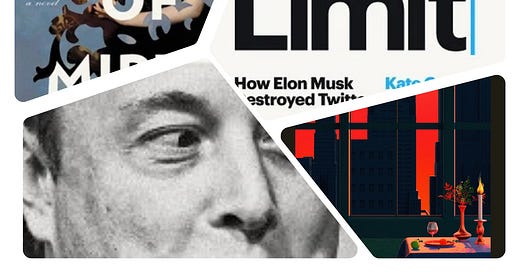“The hearts of the wise are in the house of mourning and the hearts of fools are in the house of mirth.” Ecclesiastes 7:4
Hello readers,
In Character Limit: How Elon Musk Destroyed Twitter, journalists Kate Conger and Ryan Mac offer a chronological play-by-play of the billionaire's privatization of the social media app beginning in 2022. As I mentioned before, it’s 418 pages long—over fifteen hours if you choose the audio book.
When I first put it on my Resting Rich Face reading list back on January 5, it felt a bit silly to me. Was I really going to spend this much time on Twitter? Had I learned nothing about the folly of attention seeking and mimesis from the tragedy that befalls poor Lily Bart in The House of Mirth?
But now it’s clear. Lily Bart is all of us. And Character Limit lays out the path of our downward fall.
Main character energy
The portrait that emerges from the book is of a man with distinct “main character energy” but whose character is flawed by a need to be perceived as …
Keep reading with a 7-day free trial
Subscribe to The Booktender to keep reading this post and get 7 days of free access to the full post archives.




